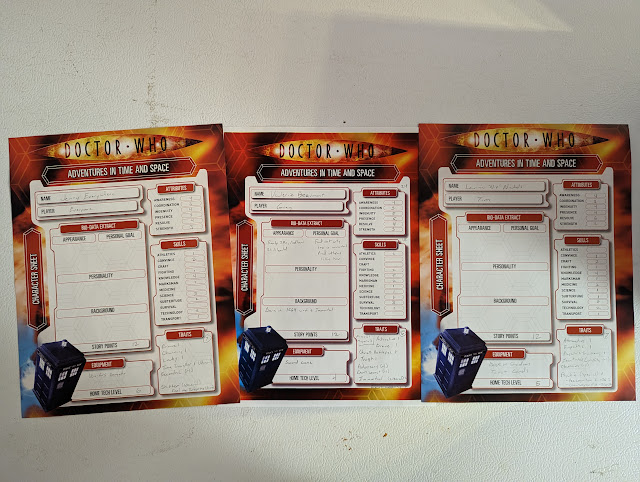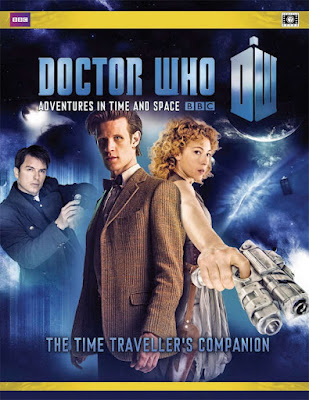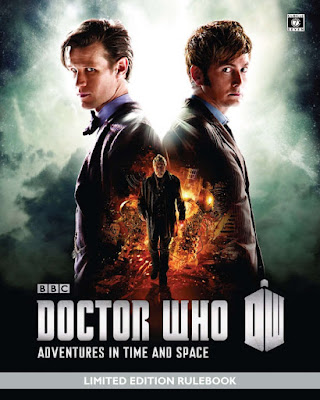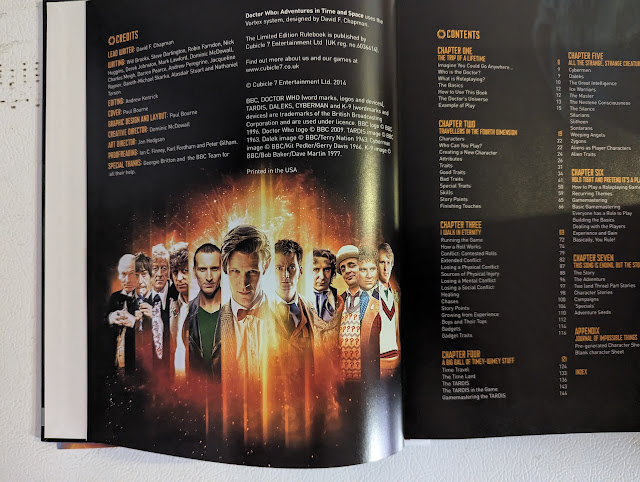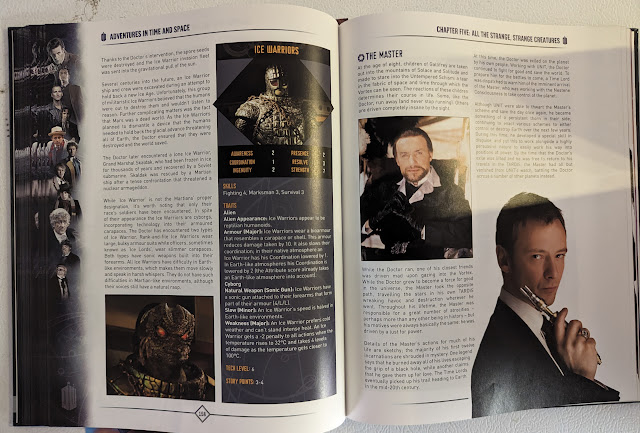The year is 2013 and the place is TNP (oops, sorry wrong RPG) Earth. Doctor Who is celebrating it's 50th anniversary and there is a big to do to be had. We see the 8th Doctor regenerate, not into the 9th Doctor, but the War Doctor. We see the final days of the Time War. We get to see ALL the Doctors (some via archival footage) come back to save Gallifrey. And we even get a special sneak peak at something that has not paid off till now, 10 years later. In the RPG scene, Cubicle 7 releases a new Doctor Who RPG limited edition printing. This time it is a full-color hardcover rule book.
Doctor Who: Adventures in Time and Space Limited Edition Hardcover Edition
Hardcover and PDF. 256 pages, full-color covers and art with color and black & white photographs.
For this review, I am considering my hardcover version and the PDF from DriveThruRPG.
Ok. I want to state outright that the rules in this game are really no different than the previous two boxed sets that I have covered. If you have either or both of those there is not a lot of new you will find here. That is ok. Let me explain why.
Prior to this volume, the rule books were focused mostly on the current Doctor. This is a trend that will continue on to and likely past the Second Edition of the game. This edition, while still using the BBC trade dress for Matt Smith's later (and last) seasons, brings in photos and imagery from all the past Doctors. This makes this book feel more like a full Doctor Who game, something I have not felt since the FASA books. The content still favors the NuWho series but there is enough here and there to get a real feeling of depth and history. The character sheets are the same 11th Doctor format for example.
Secondly, and just as importantly, this is a hardcover book. It is sturdier than my 10th Doctor softcovers, but of course, no dice, no sheets, and no extras that you get with a boxed set. It does have a solid Basic vs. Advanced feel to it that I like, and one that is formalized for the Second Edition.
Bigger on the Inside
As I mentioned, the rules here are not unchanged from the previous printings of this game, they are reorganized a bit. There are some edits and as expected things that happened in the series more recently are in the forefront here.
The obvious strength to this new presentation of the rules is it combines what had been in the Players and Gamemasters sections into one. In the 10th and 11th Doctor's books the Gamemaster's Section repeated some information from the Player's sections. Here they have been integrated into a whole.
Chapter One: The Trip of a Lifetime
This is our introduction to the Doctor, RPGS, and this RPG in particular. Introductions on who the players are and the Gamemaster as well as how to use this book. There is also an example of play.
Chapter Two: Travellers in the Fourth Dimension
This is our character creation chapter. Here we cover the types of characters that can be played. The assumption is still Time Lord + Human Companions, but other variations are also mentioned, like No Time Lord At All, UNIT Squad/Torchwood team, and others.
We start with detailing the Attributes of the character, or the qualities of a character that are typically fixed. These are Awareness, Coordination, Ingenuity, Presence, Resolve, and Strength. Similar to the "Basic 6" of many RPGs. All these are scored from 1 to 6 with 1 being the human minimum, 6 the human maximum, and 3 being the average. Time Lords and other aliens can go beyond these. These are bought on a point-buy system.
Traits are the qualities of a character, good or ill. There are Minor Traits (Animal Friendship, Attractive), Major Traits (Boffin, Fast Healing), and Special Traits (Alien, Cyborg, Time Lord). Like Attributes, you spend Character Points to buy these. Some can be good or bad traits, and some can be Minor, Major or Special depending on how they are "bought" in character creation. "Friends" can be minor or major depending on the friend in question. "Hypnosis" can be minor, major or special depending on how powerful it is.
Skills are also purchased with Points. There are only 12 skills, unlike modern D&D and more like Unisystem, skills can be combined with any attribute as appropriate.
Chapter Three: I Walk in Eternity
This covers running the game and the basic rule(s).
Attribute + Skill (+Trait) + 2d6 = Result; Compare the result to a Task Difficulty.
That is the guiding principle for the entire game and it works really, really well. Your average Difficulty is 12 but it can be as low a 3 (super easy) or 30+ (near impossible). Contested rolls are introduced and the all-important Story Points (the little cardboard counters).
It gives us some details on the Task Difficulties; 3 for Really, Really Easy, 12 for Average, and 30 for Nearly Impossible. Additionally, there are thresholds if you roll above or below the set difficulty levels. So, for example, if you score 9 points above the roll needed, something special can happen, like extra damage or something. Likewise, if you roll poorly, something bad can happen.
The rolls, much like in Unisystem, become easier with practice, and soon you won't need any guides at all.
Contested rolls, rolls where your character is being prevented from success are also covered. The biggest example of this is combat. Example situations are given and which skills can or should be used. This is a good way to rule these since Doctor Who is not really about combat. "Combat with words" is more important and can even stop physical combat. Though there are weapons detailed here and how deadly they are.
Chapter Four: A Big Ball of Timey-Wimey Stuff
While the first three chapters can apply to every game, the is the chapter that is quintessentially Doctor Who. This covers not just roleplaying, but roleplaying in Time Travel games. Here we get a lot of advice on how, well, to keep gamers from being gamers and avoiding paradoxes.
We get some background on Time Lords and TARDISes. Not encyclopedic details mind you, but enough to keep players and gamemasters happy. This covers dealing with damage to Time Lords and regeneration.
The section on TARDISes is updated, reflecting notions and ideas seen in the show at this point.
Chapter Five: All the Strange, Strange Creatures
Here we get to all the aliens. While some are certainly foes to be fought (Daleks, Cybermen) there is a lot here that run the spectrum of friend to fiend. Creatures use the same stats as characters. So it is expected that there are some "Alien Traits" here as well. These work just like Character Traits, but are typically not bought by characters.
Plenty are covered here, but there is an emphasis on ones that have appeared more recently and ones that have appeared in both the new and classic series. So for example the entry on the Great Intelligence not only covers the "Servers" and eyeless men from the 11th Doctor, but also the Yeti from the 2nd Doctor. There are old and new Ice Warriors. We get the Master in both his John Simms and Anthony Ainley depictions.
Old and new Autons. Silurians and the Sea Devils. It's not every monster or alien, but it is a good selection of "Greatest Hits." There is also enough information here to make your own.
Plus it is one of the best places to see all the variations of Cybermen and Daleks all in one place.
Chapter Six: Hold Tight and Pretend It's a Plan
This covers good roleplaying and how to play in a Doctor Who game. We also get tips on being a good Gamemaster here.
Chapter Seven: The Song is Ending, But the Story Never Ends..!
This is our Gamemaster chapter. This includes where (and when) to set them and a basic 5-act adventure formula. Other tips and tricks covered are personal story arcs (think Donna or Clara), cliffhangers, two (or three) part stories, and more.
In this version, we also get some Adventure Seed ideas. These are great since each one focuses on an earlier regeneration of the Doctor.
Appendix: Journal of Impossible Things
Character sheets. We get the 11th, 10th, and War Doctors. Clara, Amy, Rory, River, Rose, Sarah Jane, K-9, the Brigadier, and his daughter Kate. There are also archetypes, UNIT Soldier, Scientist, Rock Star, and Adventuring Archaeologist. A blank sheet, and a cheat sheet.
There is also an index.
While rule-wise there is nothing "new" here this feels like a good solid revision and has been my "go-to" book for Doctor Who for some time now.
If you are a classic Doctor Who fan and want to play the "new" RPG then this is a great place for you to start. This is true especially of anyone coming to this game from FASA Who. You will need to get some dice, but since the game uses 2d6 exclusively that is not too hard to do.





